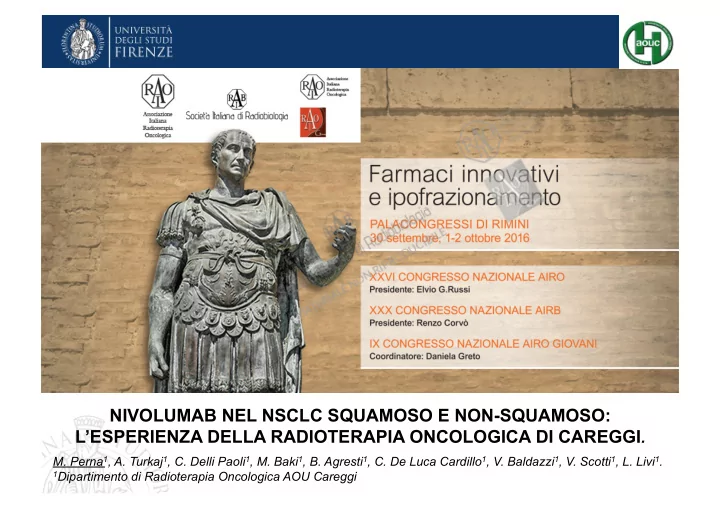

NIVOLUMAB NEL NSCLC SQUAMOSO E NON-SQUAMOSO: L’ESPERIENZA DELLA RADIOTERAPIA ONCOLOGICA DI CAREGGI . M. Perna 1 , A. Turkaj 1 , C. Delli Paoli 1 , M. Baki 1 , B. Agresti 1 , C. De Luca Cardillo 1 , V. Baldazzi 1 , V. Scotti 1 , L. Livi 1 . 1 Dipartimento di Radioterapia Oncologica AOU Careggi
Immuno-Oncology: Storyline Da dove veniamo? Che siamo? Dove Andiamo? – P. Gauguin (1897) 1980 1990 2000 2010 2020 1970 Conventional Chemotherapy Targeted Therapy Immuno-Oncology Immuno-Oncology is the 3° Big Wave in Systemic Therapy for Cancer
Mechanism of Action Nivolumab binds PD-1 receptors on T cells and disrupts negative signaling triggered by PD-L1/PD-L2 to restore T-cell antitumor function
Milestones Checkmate 017 Stage IIIb/IV SQ NSCLC 1 prior PT-DC, ECOG PS 0-1 N= 272 Nivolumab Randomize Docetaxel 3mg/kg Iv Q2W 75 mg/m 2 Iv Q3W 1:1 N=135 N=137 Until PD or unacceptable toxicity Until PD or unacceptable toxicity The median OS was 9.2 months with Nivolumab versus 6.0 months with Docetaxel Checkmate 057 Stage IIIb/IV NON SQ NSCLC 1 prior PT-DC, ECOG PS 0-1 N= 582 Nivolumab Randomize Docetaxel 3mg/kg Iv Q2W 75 mg/m 2 Iv Q3W 1:1 N=292 N=290 Until PD or unacceptable toxicity Until PD or unacceptable toxicity The median OS was 12.2 months with Nivolumab versus 9.4 months with Docetaxel
Demography All Treated Patients (N = 24) Nivolumab Current Status No. % Age Ongoing 12 (50%) Median 66 End 12 (50%) Range 43-81 Sex Male 12 50 Female 12 50 Tumor Cell Histology Median Cycles Number: 11,25 Non Squamous 14 58 Squamous 10 42 Stage IIIB 12 50 Non Squamous Squamous IV 12 50 No. line of N treatment No. line of N treatment II 14 58 II 6 8 III 7 29 III 5 2 IV 2 9 IV 2 0 V 1 4 V 1 0 Non Squamous Nivolumab 100 mg/10 ml EAP Squamous 648/96 AIFA 3mg/kg Iv Q2W Jul 2015 Sep 2015 Mar 2016
Toxicity GRADE Total 1 2 3 4 5 Fatigue 7 Skin 4 1 0 0 0 Nausea/Vomiting 6 Mucositis 3 0 0 0 0 Skin 5 Nausea/Vomiting 5 1 0 0 0 Endocrine 4 Diarrhea 0 2 1 0 0 Mucositis 3 Costipation 0 0 0 0 0 Pneumonia 3 ALT/AST 0 0 0 0 0 Kidney 3 Fatigue 3 4 0 0 0 Diarrhea 3 Dyspnea 1 0 0 0 0 Dyspnea 0 Endocrine 4 0 0 0 0 Costipation 0 Pneumonia 1 1 1 0 0 AST/ALT 0 Kidney 3 0 0 0 0 Average time before toxicity: 38.8 days No one discontinued Nivolumab due to toxicity Checkmate 057 Checkmate 017 Any Grade Grade 3 o 4 Any Grade Grade 3 o 4 Fatigue 46 3 Fatigue 21 1 Nausea 34 2 Nausea 12 0 Diarrhea 30 2 Diarrhea 10 0
Clinical Outcomes Time to treatment failure (TTF) is defined as the time from baseline (start of treatment) to discontinuation for any reason, including disease progression, the toxicity of the treatment, the patient's choice or death. Days (range) Months (range) TTF 180 (26-402) 6 (0.87-13.40) Clinical Benefit N° CR 0 17/24 patients RP 6 (71%) SD 6 pPD 3 PD 5 NO 4
Clinical Outcomes in Fit Patients Fit Patients: at least 6 cycles and PS 0-1. N° of Patients: 15 Days (range) Months (range) TTF 243 (92-402) 8 (3.07-13.40) N° Clinical Benefit CR 0 12/15 patients RP 6 (80%) SD 6 pPD 3 PD 0 NO 0
Immunotherapy and Radiotherapy Radiation and Dual Checkpoint Blockade Activates Non- Redundant Immune Mechanisms in Cancer C Twyman-Saint Victor , AJ. Rech , A Maity , R Rengan , KE. Pauken , E Stelekati , JL. Benci , B Xu , H Dada , PM. Odorizzi , RS. Herati , KD. Mansfield , D Patsch , RK. Amaravadi , LM. Schuchter , H Ishwaran , R Mick , DA. Pryma , X Xu , MD. Feldman , TC. Gangadhar , SM. Hahn , EJ Wherry , RH. Vonderheide , and AJ. Minn Nature. 2015 April 16; 520(7547): 373–377. doi:10.1038/nature14292. Organ DTF Technique Stopped Nivolumab Resumed Nivolumab Toxicity (Gy) (days) (days) (grade) 1 Brain 30 WBRT 9 32 Nausea (G1) Fatigue (G1) 2 Kidney 40 SBRT 17 14 - 3 Adrenal 36 SBRT 22 24 Fatigue (G1) 4 Brain 30 SBRT 14 38 -
Conclusions NIVOLUMAB MONOTHERAPY 3 mg/kg IV q2w • Well tolerated • Good responde profile • Encouraging data on survival Radiotherapy during treatment doesn’t show an increased toxicity. It will be necessary to continue the analysis to obtain more information about survival and response rate.
Thanks for Your Attention
Recommend
More recommend